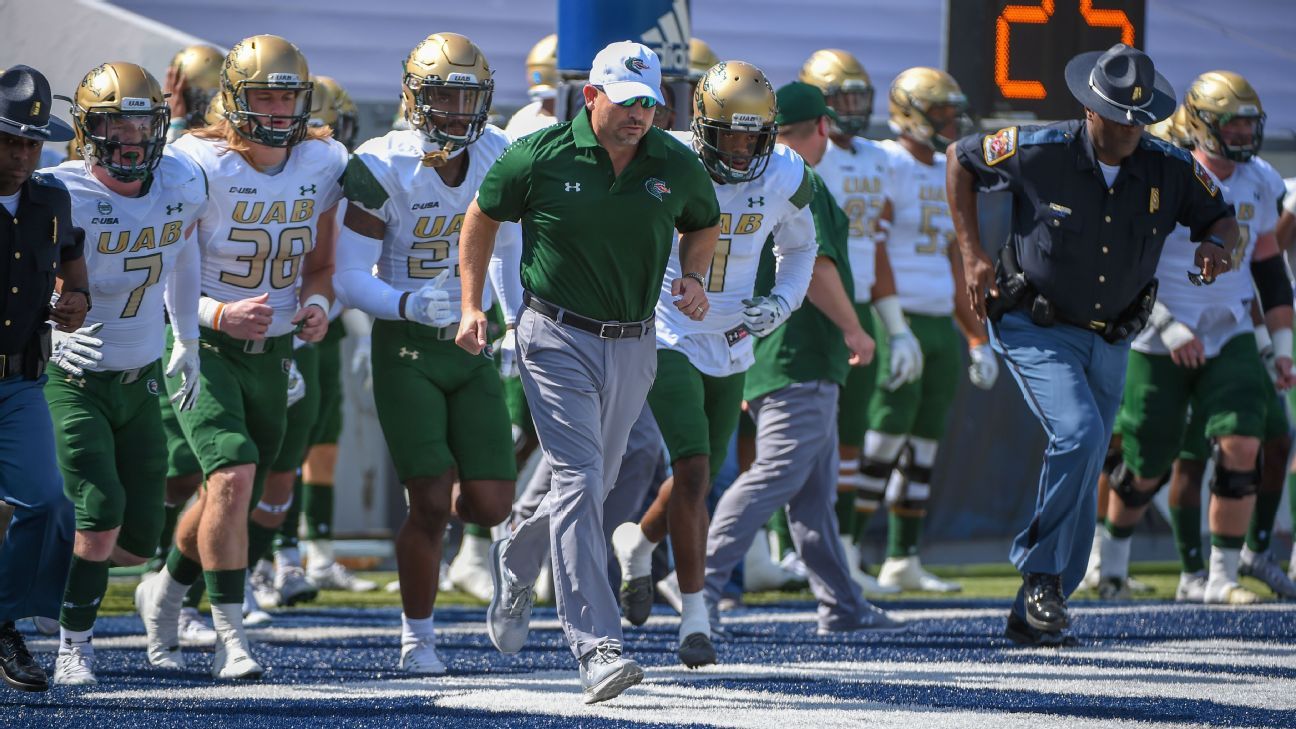During the conference realignment boom of the early-2010s, Conference USA lost half of its membership to the AAC and aimed to replace it with markets over proven commodities. It added programs from near Miami (FAU, FIU), Nashville (MTSU, with WKU not that far away) and Dallas (North Texas), plus startups from Charlotte, San Antonio (UTSA) and Hampton Roads (Old Dominion). Only one addition had proven itself particularly serious about football (Louisiana Tech).
The result was somewhat predictable: C-USA remains a conference with recruiting potential and on-field inconsistency. In terms of average SP+ ratings, it has often graded out lower than the Sun Belt, a.k.a. the conference from which it poached many of the above teams. The West division has its share of upside — North Texas, Louisiana Tech, and UAB have all enjoyed historically successful campaigns in recent years — but it heads into 2020 with quite a few starting QBs to replace and, in UAB, a three-peat favorite.
Jump to: UTEP | UTSA | Rice | North Texas
Louisiana Tech | Southern Miss | UAB

UTEP
Head coach: Dana Dimel (2-22, third year)
2019 record: 1-11 (0-8), 127th in SP+
2020 projection: 2-10 (1-7), 130th in SP+
Top returning players: DE Praise Amaewhule, CB Josh Caldwell, WR Jacob Cowing, S Justin Prince, LG Bobby DeHaro
Bill Snyder lost 19 of his first 25 games against FBS competition early in his legendary rebuild at Kansas State. Todd Monken lost 21 of 24 in reversing the fortunes of a moribund Southern Miss nearly a decade ago. At Eastern Michigan, Chris Creighton took over in 2014 and lost 22 of his first 24.
Sometimes rebuilds take a while. If you’re Dana Dimel, now 1-21 against FBS teams two years into your tenure at UTEP, you’re repeating this like a mantra. Maybe with some “It’s always darkest before the dawn” mixed in. And some “When I said ‘five-year plan,’ I meant it.”
Dimel witnessed one of the greatest turnarounds — Snyder’s — first-hand as an assistant. He has head coaching experience (at Wyoming and Houston), he knows the obstacles, and knows that installing the kind of culture he probably wants to see takes a lot of time. But providing a smidgen more proof-of-concept wouldn’t be the worst thing in the world.
Dimel inherited from Sean Kugler an 0-12, last-in-SP+ program, and in his two years in charge UTEP has ranked 130th and 127th. His 2019 Miners were not completely horrible at running or defending the run, but the forward pass was mostly disastrous, and after narrowly defeating FCS’ Houston Baptist, they lost 11 straight.
Worse, they weren’t even struggling with guys who would return in 2020. UTEP heads into 2020 having to replace its top two quarterbacks, leading rusher, five of seven receivers, two of three defensive linemen, five of six linebackers, and top three safeties. Granted, losing ineffective starters is easier to take than losing stars, but you still need someone to replace them. And the fact that Dimel signed nine juco defenders tells you a lot about what he thought of last year’s understudies.
Jucos aside, there’s a chance the youth movement begins in Year 3. Dimel has at least one intriguing youngster in every unit on the field, from running back Deion Hankins to defensive end Praise Amaewhule, and of the five “best returning players” I listed above, only cornerback Josh Caldwell is a senior. Whatever the Miners accomplish in 2020, it’ll primarily be with guys who return in 2021.
Barring an incoming grad transfer (which is always a possibility), the starting QB will likely be either junior Gavin Hardison or redshirt freshman TJ Goodwin, one of the more well-regarded recruits Dimel has signed. The QB of choice will inherit a receiving corps led by a sophomore (big-play Jacob Cowing) and some rare seniors. Expect Dimel and offensive coordinator Mike Canales to try to get the tight end position more involved as well.
Two other key seniors: cornerbacks Caldwell and Duron Lowe. They’re solid, but they need help from the pass rush, and defensive coordinator Mike Cox is evidently moving from a 3-4 to a 4-3 to generate one. Amaewhule was the team’s only decent pressure generator, so it would help immensely if either or both of two juco ends (Jadrian Taylor or Deylon Williams) became immediate hits.
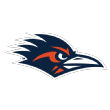
UTSA
Head coach: Jeff Traylor (first year)
2019 record: 4-8 (3-5 in MAC play), 124th in SP+
2020 projection: 4-8 (3-5), 124th in SP+
Top returning players: DT Jaylon Haynes, WR Zakhari Franklin, LB Clarence Hicks, DE DeQuarius Henry, LG Spencer Burford
Things started out well for Frank Wilson. The former LSU assistant, and now-former UTSA head coach, had gotten a shot at his first collegiate head coaching job in part because of his recruiting prowess, but he didn’t wait for his recruiting to set in before beginning to prove himself.
Wilson walked right in the door and made improvements with former coach Larry Coker’s guys and an inspired defensive coordinator hire (current Alabama DC Pete Golding). They went 12-12 in his first two years, peaking at 34th in defensive SP+. It was easy to see big things ahead.
Instead, Golding and first-round NFL draft pick Marcus Davenport left, and UTSA collapsed. A combination of injuries and youth crippled the team in 2018, and following another year of bailing sand in 2019 (4-8 and 124th in SP+), Wilson was let go, his tenure having basically gone backwards from what was expected.
Now it’s Jeff Traylor’s turn. He spent the last two years serving as Chad Morris’ associate head coach and running backs coach at Arkansas, and before joining up with Morris at SMU in 2017, he spent two years with Charlie Strong at Texas. Failure after failure, right? But really, his résumé is a lot like Wilson’s — he spent 15 years building a massively successful program at Gilmer (Texas) High School, and he was regarded as an ace recruiter in both Austin and Fayetteville. And hey, he’s learned a lot in recent years about potholes to avoid in building a program. So have his coordinators, Barry Lunney Jr. (offense) and Tyrone Nix (defense).
It would be a surprise if Traylor and his cohorts didn’t recruit pretty well. How they develop players and call plays remains to be seen, but they do inherit an experienced squad. UTSA returns three tested QBs, most of its skill corps, five offensive linemen with starting experience, a veteran heavy defensive front six/seven, and a secondary no longer loaded with freshmen.
Proven entities? There are at least a few: running back Sincere McCormick, slot receiver Zakhari Franklin, guard Spencer Burford and center Ahofitu Maka on offense, along with defensive tackle Jaylon Haynes, end DeQuarius Henry, linebacker Clarence Hicks, safety Rashad Wisdom and place kicker Hunter Duplessis.
It would be easier to feel better about UTSA’s chances this year if I’d listed a QB above. Lowell Narcisse, Frank Harris and Jordan Weeks all saw action last year, and they didn’t do much with their opportunities. Narcisse is a decent runner but completed just 53% of his passes. Harris completed 73% of his passes, but they didn’t go anywhere (7.4 yards per completion). All three ended up averaging between 4.2 and 4.9 adjusted net yards per pass attempt.
UTSA’s 2020 season begins with a trip to LSU. This was intended to be a homecoming of sorts for Wilson, but now another ace recruiter with high school experience picks up the mantle. It would be a surprise if Traylor got rolling quite as quickly as Wilson did.

Rice
Head coach: Mike Bloomgren (5-20, third year)
2019 record: 3-9 (3-5 in MAC play), 121st in SP+
2020 projection: 5-7 (4-4), 115th in SP+
Top returning players: LB Blaze Alldredge, RG Shea Baker, LB Treshawn Chamberlain, CB Tyrae Thornton, WR Brad Rozner
In Major League Baseball, a quarter of your season is 40 games, nearly two months’ worth of baseball. In college football, it’s three games taking place in as little as 14-15 days. And your view of what Rice is capable of in 2020 depends on what you draw from such a three-game sample.
For most of Mike Bloomgren’s second season at Rice, the Owls carved out an underdog-friendly, “slow the game to a crawl and minimize possessions” approach that kept games closer than they appeared, but through nine games they were 0-9 and 125th in SP+.
Then came the three-game sample. They raced out to a big lead at MTSU and held on to secure their first win of the year, then they went out and beat North Texas and UTEP to finish an unlikely 3-9.
Granted, this would be more exciting if quarterback Tom Stewart and running back Aston Walter, key role players in the win streak, were back. But receivers Brad Rozner and Austin Trammell, linebackers Blaze Alldredge and Antonio Montero, rush end Ikenna Enechukwu, etc., all played huge roles, too. The secondary looked great against UNT and UTEP and returns mostly intact.
Due to a massive return of defensive production, the Owls are projected to improve from 96th to 65th in defensive SP+. Alldredge (21.5 TFLs, 24 run stuffs) is one of the best (and most well-coiffed) linebackers in college football. Fellow seniors like tackle Elijah Garcia and safeties George Nyakwol and Naeem Smith are solid. Enenchukwu and a few other sophomores flashed playmaker potential. Defensive coordinator Brian Smith appears to have the pieces he needs, especially in the front seven.
The 43-year old Bloomgren has one of the most fascinating bios in the sport; he played at the NAIA level and has been an assistant in Division II, the Power Five and the NFL. But despite diverse influences, you can see a lot of Stanford in what Bloomgren is trying to build. The Owls deploy a bottom-10 tempo and run the ball as much as they can.
Unfortunately, they could only run so much since they were horrible at it for most of 2019, and as solid as the defense might be, there’s no reason to believe the offense will thrive. At least, not unless sophomore running back Juma Otoviano has a breakout campaign.
Otoviano missed most of 2019 due to injury but thrived late in 2018, and he’s the only returning back with any experience whatsoever. The line is replacing three starters, though, so the odds are decent that the new starting quarterback — sophomore Wiley Green? redshirt freshman JoVoni Johnson? Juco transfer TJ McMahon? TCU transfer Mike Collins? — will be asked to convert third-and-longs pretty frequently.
The schedule features five home games against teams projected 100th or worse in SP+, which gives the Owls a 37% chance of reaching bowl eligibility. Bloomgren doesn’t have all the pieces he needs, but he’s building an identity, and last year’s late run provided some proof of concept.

North Texas
Head coach: Seth Littrell (27-25, fifth year)
2019 record: 4-8 (3-5 in MAC play), 93rd in SP+
2020 projection: 5-7 (4-4), 111th in SP+
Top returning players: WR Jyaire Shorter, DT Dion Novil, LB Tyreke Davis, RB Tre Siggers, RG Manase Mose
Seth Littrell projects confidence. The former Oklahoma fullback has a jaw carved out of granite and looks like he was born wearing cowboy boots. It doesn’t appear that much fazes him. The 2019 season was a test of that, though.
Nothing really went right for Littrell’s Mean Green. They lost offensive coordinator Graham Harrell to USC, quarterback Mason Fine battled injuries all season, and the UNT defense couldn’t pick up the slack. After a 2-2 start, they imploded, losing to Houston, Southern Miss and Louisiana Tech by a combined 74 points and falling from 9-4 in 2018 to 4-8. Despite this, Littrell didn’t panic and start ripping off redshirts in search of desperate answers.
Sixteen freshmen from his 2019 signing class redshirted, and his search for new answers in 2020 hasn’t included a glut of transfers. (Not yet, anyway.) Littrell appears to be mindfully attempting to build a long-term program despite his status as a young(ish) up-and-comer on the Power Five radar.
Of course, there’s nothing guaranteeing he’ll find better answers on the two-deep this fall. Fine has graduated, the offensive line has to replace five of seven regulars, and the secondary loses four of its top six tacklers. Littrell’s pipeline of redshirts better quickly produce contributors.
Littrell did make a couple of pretty big changes on his staff, firing both offensive coordinator Bodie Reeder and defensive coordinator Troy Reffett. He brought former Tulsa assistant Mike Bloesch in to serve as co-OC with Tommy Mainord; more notably, he hired former Kansas DC Clint Bowen.
Bowen didn’t always have the pieces he needed in Lawrence, when he had a sturdy front seven, he knew how to deploy it. Nose tackle Dion Novil (13 TFLs, 17 run stuffs) is one of the most active 315-pounders you’re going to find, and Tyreke Davis (14 TFLs, 4.5 sacks) is a standout in a veteran linebacking corps. UNT should be decent against the run, but it’s hard to be as confident about the pass defense. Corner Cam Johnson and safety Makyle Sanders are decent, but here’s where at least one youngster absolutely needs to emerge.
Offensively, as with most schools, it depends on the QB. Fine leaves a pretty high bar after topping 12,000 career passing yards. The most likely Fine replacements are sophomores Jason Bean or Austin Aune, a former New York Yankees farmhand. Turnover on the line won’t help the new starter, but an adept skill corps will. Veteran receivers Jaelon Darden and Greg White return, and sophomores Jyaire Shorter and Deonte Simpson could be dynamite. Running back Tre Siggers is efficient as well, if the line opens up any holes, anyway.
The Mean Green will have to weather a rough start. They will be, per SP+, double-digit underdogs in three of their first four games, and SP+ gives them just a 44% chance of bowling — not bad for a team that went 4-8 last year but not great for a program that seemed to be rising quickly not too long ago.
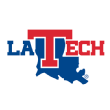
Louisiana Tech
Head coach: Skip Holtz (56-36, eighth year)
2019 record: 10-3 (6-2), 62nd in SP+
2020 projection: 7-5 (5-3), 92nd in SP+
Top returning players: C Kody Russey, DE Milton Williams, RB Justin Henderson, LB Ezekiel Barnett, LB Willie Baker
Louisiana Tech has produced one of the best QBs (Terry Bradshaw), offensive linemen (Willie Roaf) and defensive ends (Fred Dean) the sport has seen, plus one of its longest-tenured NFL kickers (Matt Stover), and one of its most accomplished McCowns (Luke). Troy Edwards won the Biletnikoff Award in 1998 and got drafted 13th overall. Ryan Allen won the Ray Guy Award twice. Jaylon Ferguson set the FBS career sacks record not long ago.
It’s pretty easy to find dudes with huge chips on their shoulders who are willing to come to Ruston to prove themselves. What hasn’t been easy, however, has been finding enough of them to win consistently. At least, not until the 2010s. Veteran Skip Holtz has led the Bulldogs to at least nine wins in four of the last six seasons. They have not only bowled six times in a row, but won all six. And with an Independence Bowl win over Miami, they crossed the 10-win barrier for the first time in FBS last fall.
With a new starting quarterback and a completely re-tooled defense, it will be hard for Tech to back up last year’s achievement. But SP+ trusts steady entities and still projects a seven-win season.
Holtz has done a good enough job of hiring assistants that he’s been forced to hire a lot of them. After replacing former DC Blake Baker (who left to become a part of former Tech DC Manny Diaz’s staff at Miami), Holtz brought in Bob Diaco, who improved the Bulldogs from 56th to 50th in defensive SP+ and left for Purdue. So now it’s former Old Dominion DC David Blackwell’s turn at the wheel. He does not inherit a particularly experienced unit.
Tech should be strong, as usual, on the edge with ends Milton Williams and Tristan Allen and OLBs Ezekiel Barnett and Willie Baker (combined: 27.5 TFLs in 2019). But of the 13 players to log at least 300 snaps last season, Williams, Barnett, Baker, and safety Bee Jay Williamson are the only ones returning. Holtz has been recruiting well of late, but we’re about to find out just how well.
Holtz lost offensive co-coordinator Todd Fitch to Vanderbilt, too, and promoted fellow co-OC Joe Sloan to solo OC. Sloan has been a fast riser and strong recruiter. He inherits far more known entities than Blackwell, though they come from an offense that ranked 84th in SP+, and the list doesn’t include QB J’Mar Smith, who departs after throwing for 9,523 career yards.
Whoever wins the QB job, be it sophomore (and favorite) Aaron Allen or someone else, there will be talent around him in the form of 1,000-yard rusher Justin Henderson, efficient senior slot man Cee Jay Powell — yes, Tech has a Bee Jay and a Cee Jay — and explosive WRs Griffin Hebert and Isaiah Graham. The line has starters to replace but returns stellar center Kody Russey and left tackle Willie Allen.
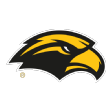
Southern Miss
Head coach: Jay Hopson (28-22, fifth year)
2019 record: 7-6 (5-3), 89th in SP+
2020 projection: 7-5 (5-3), 87th in SP+
Top returning players: QB Jack Abraham, LB Racheem Boothe, DE Jacques Turner, WR Tim Jones, LB Swayze Bozeman
Southern Miss rises to the occasion. The Golden Eagles have beaten SEC teams 35 times. Hell, they beat Florida State twice in the 1980s.
Granted, their best home-run swings are followed by sustained periods of listlessness. They followed a heroic win over No. 6 Florida State in 1989 with four straight losses, and when they broke through and won 12 games and a Conference USA title in 2011, they proceeded to then lose an incredible 23 games in a row. But they make their best performances count.
Maybe that’s why the Jay Hopson era has felt rather underwhelming thus far.
In theory, things are going pretty well. Despite the standard, steady stream of powerful non-conference opponents, the Eagles have finished above .500 each year. But they’ve lost their last seven games against P5 teams by an average of 23 points. They’re beating most of the lesser opponents on the schedule, but the upside hasn’t been quite as high.
Southern Miss is projected just 87th in SP+ this fall, and a Sept. 26 trip to Auburn is likely out of reach. Still, the Eagles’ schedule still offers a chance at a nice win total: they play eight teams projected 92nd or lower, and they could approach double-digit wins if a new offensive coordinator finds his footing.
Hopson’s third OC in three years is a good one. Matt Kubik produced two top-50 offenses (per SP+) at ULM, and it’s not hard to see Kubik liking what he finds in Hattiesburg. The Golden Eagles are one of only three C-USA West teams to bring back an incumbent QB. Jack Abraham threw for just short of 3,500 yards last fall despite an inefficient run game weighing him down, and while the receiving corps has been thinned out a bit, the two most efficient options (Tim Jones and Jaylond Adams) return. Hopson signed three juco receivers, as well, to address potential depth issues.
The run game could still be all-or-nothing, but the line returns eight players with a combined 94 career starts, including guard and all-conference candidate Arvin Fletcher.
If the offense takes a decent step forward, a defense that ranked 65th in SP+ will take it from there. Of the eight players who logged at least 6.5 havoc plays last year (TFLs, passes defensed, or forced fumbles), five return: linebackers Swayze Bozeman and Santrell Latham, end Jacques Turner, safety Shannon Showers, and corner Rachuan Mitchell.
Losing nickel back DQ Thomas hurts, but longtime defensive coordinator Tim Billings appears to have some strong athletes to choose from, and as with the receiving corps, Hopson signed a handful of juco DBs to assure the depth is what it needs to be.
With more consistency, Southern Miss could have a plus-special teams unit, too: Jaylond Adams returned three kicks for scores but produced almost no other successful returns, and kicker Andrew Stein made 3 of 5 field goals of 40+ yards but missed a couple of chip shots and three PATs.
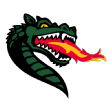
UAB
Head coach: Bill Clark (34-19, fifth season)
2019 record: 9-5 (6-2), 67th in SP+
2020 projection: 9-3 (6-2), 68th in SP+
Top returning players: S Dy’jonn Turner, LB Jordan Smith, WR Austin Watkins Jr., LB Kristopher Moll, LT Sidney Wells
The “resurrection” chapter of the UAB football history book is officially over. The “C-USA heavyweight” chapter has begun
A quick recap, in case you’re new to the story:
1. In 2014, Bill Clark took over what had been, for most of its FBS existence, a disappointing UAB program. The Blazers had bowled just once, and in the eight years preceding Clark’s arrival, they averaged 3.3 wins per year.
2. After Clark’s intriguing 6-6 debut, UAB’s football program was discontinued due to supposed (and disputed) financial issues. It was long rumored that an unfriendly, Bama-centric board of trustees was at the root of much of UAB’s lack of support. Regardless, the program was dead…
3. …until it wasn’t. After months of outrage and investigation, the school announced the football program would return, this time with far more support.
4. Clark remained in Birmingham, patched together a new roster and picked up right where he left off. UAB went 8-5 in 2017, then won 11 games and a Conference USA title in 2018. And after losing a large chunk of their transfer-heavy two-deep, the Blazers won nine more games with another C-USA West title in 2019.
UAB is coming off of its three best seasons ever and, beginning in 2021, is finally getting the on-campus stadium it has long craved. Everything’s coming up Blazers.
Perhaps the most encouraging part of UAB’s rise: Clark’s only figured out one side of the ball so far. The offense ranked 104th and 118th, respectively, in offensive SP+ in 2018-19. Coordinator Bryant Vincent deploys a run-heavy offense that, in 2019, could not run the ball. Quarterback Tyler Johnston III was solid, and UAB got to play plenty of bad defenses, but against four opponents ranked in the SP+ top 60, UAB averaged just 10.8 points per game.
Johnston and senior receivers Austin Watkins Jr. and Myron Mitchell could be capable of huge things, and it’s possible that the run game will take a step forward with Jermaine Brown Jr. more involved. UAB’s two highest point totals came when the sophomore-to-be was the primary ball-carrier. He, burly Spencer Brown, and semi-explosive Lucious Stanley will be running behind an experienced line, too.
On defense, Clark and DC David Reeves are producing absurd results. UAB ranked 28th in defensive SP+ in 2019 — third-best among Group of Five teams — despite replacing eight starters. They were remarkably efficient, and they enjoy all the continuity they didn’t a year ago.
The linebacking corps is one of the country’s best at any level. Kristopher Moll, Noah Wilder, and Jordan Smith combined for 44 tackles for loss, 22 sacks, nine forced fumbles, and 59 run stuffs last year. The safety trio of Will Boler, Dy’jonn Turner, and Grayson Cash is active and aggressive as well.
SP+ doesn’t project any offensive improvement, but the schedule is again light: UAB faces eight teams projected 111th or worse in SP+. The odds of a third straight division title are solid. Evidently, to fully live, Blazer football just had to die.
